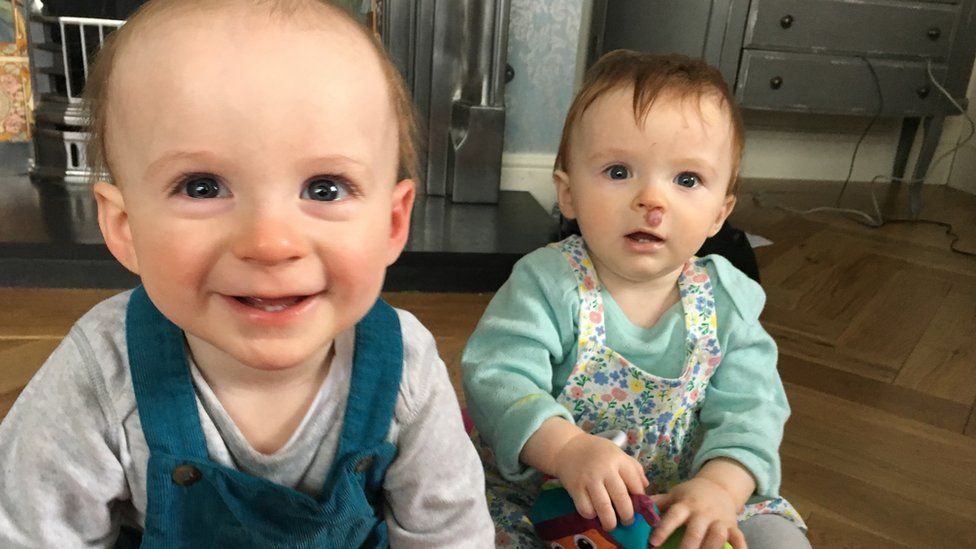Cross-border births slump in Northern Ireland
- Published

The number of babies being born in Northern Ireland to mothers with registered addresses in the Republic of Ireland has dropped by 75% in 10 years.
Almost 600 cross-border babies were born in Northern Ireland in 2008; in 2017, there were just 149.
The Southern Trust had the highest drop of almost 90%.
Residents, cross-border workers and private patients from other EU states like the Republic of Ireland can access maternity services in Northern Ireland.
The European Commission defines a cross-border worker as a person who works in a different EU country from where they live, provided they return to the country where they live at least once a week.
The country where they work is responsible for a person's social security benefits, including healthcare.
Cross-border births account for a very small number of the total births in Northern Ireland each year.
More than 23,000 births were recorded in 2017 to women who live in Northern Ireland.
Only a small number of women whose registered address is in Northern Ireland gave birth in the Republic of Ireland, less than 25 births each year since 2012.
Mandy Bredin, from Moville in County Donegal, is mum to twins Alfie and Esme.
The twins were born in Altnagelvin Hospital in Londonderry, just half an hour away from their home.
Mandy was working in Derry and was entitled to access healthcare in Northern Ireland.
"Any of my friends who work in the north have their babies in Altnagelvin because it is much closer to go to Derry than to go to the nearest hospital in the south in Letterkenny.
"As soon as the babies leave Altnagelvin, they became Donegal babies as I like to say. You contact your local health centre and register them in the Republic of Ireland."
Fall in cross border births
The highest numbers of cross-border births was recorded in the Southern Trust and the Western Trust.
The most dramatic drop was in the Southern Trust - almost a 90% decrease - falling from 395 births in 2008 to just 45 in 2017.
The figures only relate to women whose registered address is in the Republic of Ireland.
The figures do not include women who live in the Republic of Ireland who falsely report their registered address is in Northern Ireland to receive free healthcare using the home address of a relative, a practice known as "grannying".
A small amount of women registered in the Republic of Ireland give birth in Northern Ireland in the case of an emergency labour, others choose to deliver in hospitals in Northern Ireland as a private patient.
This is particularly common in border counties like Donegal and Monaghan where the nearest hospital with maternity services is in Northern Ireland.
Unlike cross-border workers, private patients both work and reside in the Republic of Ireland but choose to give birth in Northern Ireland, paid for through their private health insurance.
Dr Frances O'Hagan, deputy chair of NI General Practitioners Committee at the British Medical Association, said fewer mothers were having their babies privately in Northern Ireland.
"About six years ago, changes came into place which meant that any doctor in Northern Ireland who was providing private healthcare to patients from another jurisdiction had to pay an added insurance premium.
"The additional insurance payment meant it was not commercially viable unless you were seeing enough ladies to cover the cost."
The decline in the Southern Trust was also caused by a change to its policy regarding private inpatient services.
It stopped such services in its hospitals from April 2017 across all specialties, including maternity.
The Western Trust now has the highest number of cross-border births in Northern Ireland.
Maureen Millar, head of service for Maternity and Gynaecology in the Western Trust, said the way cross-border private patients access maternity services has changed.
"They would have contacted the consultant directly and arranged maternity care through the consultant's secretary, but those consultants eventually stopped their private clinics.
"Now cross-border mothers can access maternity care in the Western Trust through a direct referral form on our website.
"Those private patients pay for their care through our accounts office.
"Women have continued to come to the Western Trust to have their babies, I know of at least four deliveries in the past couple of months."
Brexit effect?
While cross-border births only account for a very small number of total registered births in Northern Ireland, mums, like Mandy, who live closer to a hospital across the border are concerned about accessing healthcare after Brexit.
"I would like to see maternity services for cross-border mothers continue, but with Brexit we just don't know what will happen, not just with maternity care but with all healthcare and even going to work," Mandy said.
British and Irish ministers signed a deal to preserve free movement for citizens crossing the Irish border and cross-border access for health care.
The departments of health in both Northern Ireland and the Republic of Ireland have said they are committed to continuing cross-border health services after Brexit.
A spokesperson for the Department of Health in Northern Ireland said that they do not "not envisage that there will be any major disruption to cross-border health and social care services, including cross-border maternity services".
The Department of Health in the Republic of Ireland said cross-border maternity services are "expected to continue".